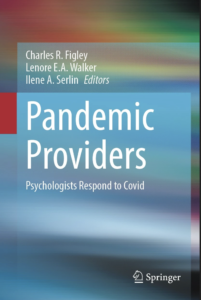I am very honored to announce the publication of the book “Pandemic Providers”. This work resulted from the collaboration I was part of during 2020-2021 among a large group of international psychologists, researchers, and mental health advocates.
It has been an honor and privilege to be part of the Interdivisional APA COVID-19 Task Force and I am grateful to my dear friends and co-authors, Jenni Frumer, PhD, LCSW, MSEd, Marilyn Safir, PhD, Tracey Farber, PhD, and Mary Beth Morrissey, PhD, JD, MPH, who worked together and contributed their parts to our chapter, entitled “Vibrant Older Adults”, describing the experiences of people like us, over 60 yet active and engaged, during the period when social distancing was required. In addition, our chapter focused on the impact of distant trauma on the experiences of the novel challenges presented by the pandemic, in particular, the reverberations of the Holocaust in the experiences of Holocaust survivors and their offspring.
Special thanks to our editors Ilene A. Serlin Lenore Walker & Charles Figley for leading this incredibly demanding project that culminated in this volume. Special thanks also to the many other fantastic contributors, including Maureen O’Reilly Landry PhD, Patricia O’Gorman, PhD, Patricia Villavicencio Carrillo, PhD, Amy Li, PhD, Radosveta Dimitrova, PhD, Arlene Lu Steinberg, PhD, and others.
The book is published by Springer and can be accessed online here.. Our chapter can be accessed at this link.


Congratulations! This is as important as studying the long term effects of the virus itself. Isabel
Dear Isable,
Thank you for your comment!
The silver lining of the virus was that it brought fore many issues that deserve to receive attention. The elevated risk during the pandemic for those of us 60 or older highlighted the existence of those who were active older adults, engaged in many ways, who had become cutoff from all their previous engagements all of a sudden, due to the need to socially isolate.
People live longer and in a sense, just like the industrial revolution and laws against child labor created a new life phase, adolescence, we now have a new life phase that can span a couple of decades or more, where people over 60 are well enough to be able to continue to remain engaged and contribute their experience and expertise professionally, as well as to family and to society, in their later years.
The well-being of such ‘vibrant’ older adults, and specific attention to what is needed in order to promote it, are necessary, including what needs to be in place to allow individuals to remain engaged when there is a personal or collective reason why they must function from home due to some limits on mobility or need for social distancing.
The generation we belong to changed what it looks like to be older, and now we have to change ageism stereotypes and even internalized ageism!
Warmly,
Irit